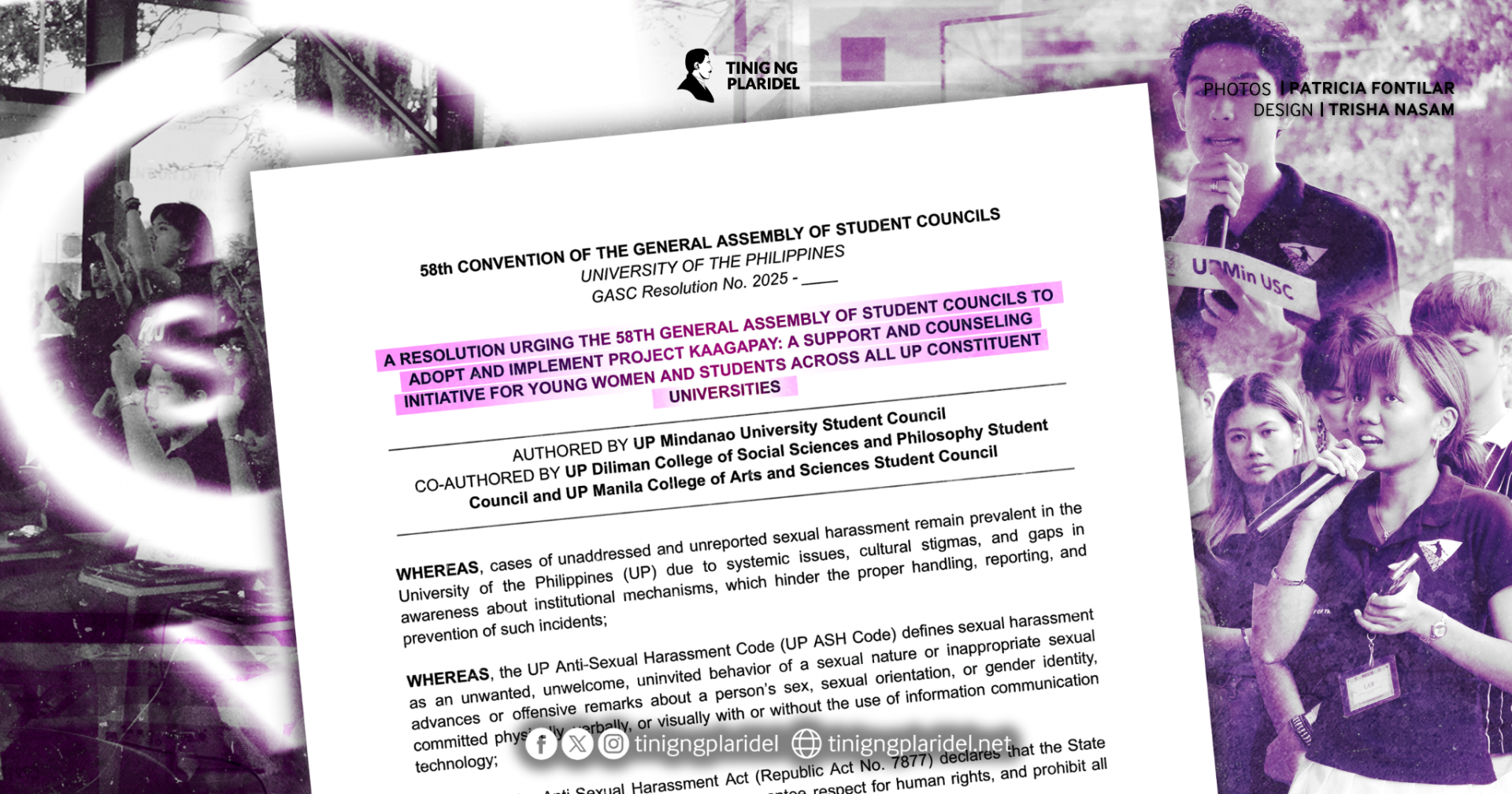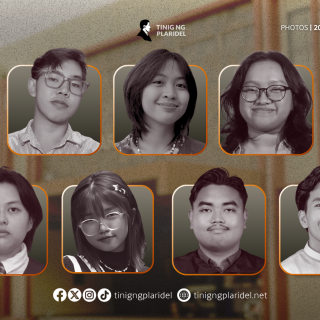With increasing reports on gender-based violence within the campus, University of the Philippines student councils have adopted a resolution for the implementation of Project KAAGAPAY across the university’s constituent units. Originating from UP Mindanao (UPMin), Project KAAGAPAY seeks to provide a victim-centered mechanism that promotes accessible support, streamlined reporting processes, and accountability on violence against women and LGBTQ+ victim-survivors.
“‘Yung purpose ng project sa pag-advance ng isang victim-centered network ay ‘yung tayo mismong student leaders ay kaya natin ipaintindi sa ating fellow students na ‘yung kanilang struggles ay magiging isang collective action, ipapaintindi natin sa kanila ‘yung sistema na kinabibilangan natin,” said UPMin University Student Council (USC).
The resolution was authored by the UPMin USC and co-authored by the UP Diliman (UPD) College of Social Sciences and Philosophy SC and the UP Manila (UPM) College of Arts and Sciences SC at the 58th convention of the General Assembly of Student Councils (GASC), held from Feb. 6-8 at UP Diliman Extension Program in Pampanga.
Despite the existence of the UP Anti-Sexual Harassment (ASH) Code, victim-survivors still face significant barriers in seeking justice. Project KAAGAPAY aims to address these challenges by providing accessible, student-led assistance in collaboration with institutional mechanisms.
To strengthen GBV and sexual harassment (SH) response approaches across UP, Project KAAGAPAY will expedite case resolution, offer paralegal training and psychological first aid, and mandate gender sensitivity and anti-sexual harassment training for student leaders.
It will also establish peer-support networks and integrate trauma-informed care training into academic and professional programs.
The initiative replicates Gabriela Youth UPMin’s KAAGAPAY, launched last January, which is an
initiative focused on providing support and counseling for young women and students, in collaboration with the university’s Office on Anti-Sexual Harassment (OASH) and other partner organizations, including the univ-wide council.
Students repeatedly cited the rigid bureaucratic processes on filing cases which hindered timely support and justice for victims of sexual harassment in UPMin.
“‘Yung situation sa UPMin, aside from bureaucratic processes ay ‘yung mga perpetrators ay hindi naho-hold accountable, alam naman natin lahat na ‘di siya isolated case, iba-iba siya kada CU [constituent unit], kung ano ‘yung state, kung paano siya tinutugunan, natutugunan ba o hindi,” said UPMin USC during the GASC.
While UP has established OASH in each constituent unit, many students remain unaware of the processes available to them or are discouraged from reporting cases due to bureaucratic delays, fear of retaliation, and lack of empathetic support mechanisms.
UPM USC lamented the lack of officials and staff in their respective OASH and the bureaucratic hurdles in processing SH cases, which further hindered students’ willingness to file complaints.
“Bagaman ang OASH ang tumatanggap ng mga reklamo, nalilimitahan ang kanilang mandato dahil sa kasalukuyang ASH Code,” the council said.
The OASH is mandated to adhere to the ASH Code. In UPD, sexual harassment cases can be filed at the OASH through its official Facebook page or email address. After a series of investigations, the final decision rests with the Chancellor.
However, according to a report by Philippine Collegian, among the 74 cases filed in 2019, only four had a final charge by the chancellor, while 20 are still awaiting its decision.
Data from the UP OASH also revealed that sexual harassment cases in UPD have significantly increased in recent years, with a record of 34 cases filed in 2018 alone.
In UP Baguio, despite having gender officers, the existing systems for handling GBV and SH cases still need further strengthening, according to their student council.
The council suggested that Project KAAGAPAY will help them to streamline support systems and clarify procedures to ensure that all survivors receive timely and appropriate assistance.
Following GASC’s approval, the project will be implemented not only in UPMin but across all UP campuses, integrating it into the existing frameworks of student councils and administrative offices.
“Ito ay tagumpay sa hanay ng mga victim-survivors at tagumpay para sa lahat ng biktima ng karahasan batay sa kasarian,” said UPMin USC Councilor Lara Felescoso.
The GASC approved 16 resolutions aimed at addressing pressing university and national issues, including the urgent removal of Vice President Sara Duterte from office, proper budget allocation for state universities, and increased awareness and participation in the 2025 midterm elections.









